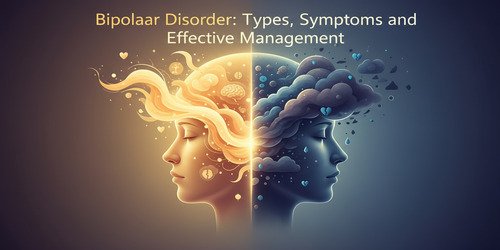Bipolar disorder is a significant mental health condition that affects millions of people worldwide. Unlike typical emotional fluctuations that everyone experiences, bipolar disorder involves intense mood swings that can dramatically disrupt daily functioning, relationships, career prospects, and overall quality of life. Understanding this mental health condition is essential for those living with it, their loved ones, and anyone seeking to recognise the signs early.
What Is Bipolar Disorder?
Bipolar disorder is a mental health condition characterised by extreme shifts between emotional highs and lows. These aren’t simply good days and bad days—they’re distinct episodes that involve profound changes in mood, energy levels, thinking patterns, and behaviour that can last for days, weeks, or even months.
The condition exists on a spectrum, with different types affecting people in varying ways. What remains constant across all forms of bipolar disorder is the cyclical nature of mood episodes that goes far beyond normal emotional responses.
Types of Bipolar Disorder
Mental health professionals recognise several forms of bipolar disorder:
- Bipolar I Disorder causes episodes of unusually high energy or intense mood changes that last for a week or more, or are serious enough to need hospital treatment. These high-energy phases are usually followed by low or depressive periods that can continue for at least two weeks.
- Bipolar II Disorder involves a pattern of mood changes where periods of depression alternate with times of increased energy or activity. These high-energy phases are milder and don’t reach the extreme levels seen in Bipolar I Disorder.
- Cyclothymic Disorder involves numerous periods of hypomanic and depressive symptoms lasting at least two years, though symptoms don’t meet the full criteria for hypomanic or depressive episodes.
Understanding which type you’re dealing with helps mental health professionals tailor treatment effectively.
Recognizing Manic Episodes: The Emotional Highs
During manic episodes, individuals with bipolar disorder experience an abnormally elevated, expansive, or irritable mood. These mental health episodes include:
Energy and Activity Changes:
- Dramatically increased energy levels despite little sleep
- Talking rapidly, jumping between topics
- Taking on multiple projects simultaneously
- Feeling like thoughts are racing uncontrollably
Behavioural Changes:
- Engaging in risky behaviors like excessive spending, reckless driving, or impulsive decisions
- Increased sexual drive or inappropriate sexual behavior
- Substance use or abuse
- Poor judgment that seems out of character
Cognitive and Emotional Symptoms:
- Inflated self-esteem or grandiose beliefs about one’s abilities
- Decreased need for sleep (feeling rested after just 2-3 hours)
- Extreme optimism or euphoria
- Irritability when others don’t share enthusiasm
- Difficulty focusing despite feeling mentally sharp
These manic symptoms can initially feel productive or creative, making some people with bipolar disorder reluctant to seek mental health treatment. However, manic episodes often lead to serious consequences, including damaged relationships, financial problems, legal issues, or hospitalisation.
Understanding Hypomanic Episodes
Hypomania involves similar symptoms to mania but less severe and shorter in duration. People experiencing hypomania may feel exceptionally productive, creative, and energetic. Unlike full mania, hypomania doesn’t cause significant impairment in daily functioning or require hospitalisation.
The danger with hypomania is that it can escalate into full mania, and it’s often followed by severe depressive episodes. Many people with bipolar disorder enjoy hypomanic periods, which can make recognising the mental health condition more challenging.
Recognizing Depressive Episodes: The Emotional Lows
The depressive phase of bipolar disorder shares characteristics with major depression but occurs as part of the bipolar cycle. These mental health episodes include:
Emotional Symptoms:
- Overwhelming sadness, emptiness, or hopelessness
- Loss of interest in previously enjoyed activities
- Feelings of worthlessness or excessive guilt
- Persistent anxiety or worry
- Thoughts of death or suicide
Physical and Cognitive Changes:
- Significant changes in appetite or weight
- Sleeping too much or experiencing insomnia
- Severe fatigue or loss of energy
- Difficulty concentrating, remembering, or making decisions
- Physical slowing or restlessness
Behavioral Changes:
- Social withdrawal and isolation
- Decreased productivity at work or school
- Neglecting personal care and responsibilities
- Loss of motivation for daily tasks
Depressive episodes in bipolar disorder can be particularly dangerous, as they carry an elevated risk of self-harm. Immediate mental health intervention is crucial if suicidal thoughts emerge.
What Causes Bipolar Disorder?
Research indicates that bipolar disorder results from complex interactions between multiple factors affecting mental health:
- Genetic Factors: Bipolar disorder runs in families. Having a parent or sibling with this mental health condition increases risk significantly, though most people with a family history won’t develop it.
- Brain Structure and Chemistry: Neuroimaging studies reveal differences in brain structure and function in people with bipolar disorder. Imbalances in neurotransmitters—chemical messengers in the brain—play a crucial role in mood regulation.
- Environmental Influences: While biology creates vulnerability, environmental factors often trigger the first episode or subsequent relapses in this mental health condition.
Common Triggers for Bipolar Episodes
Identifying and managing triggers is essential for maintaining mental health stability:
- Stress: Major life changes, work pressure, relationship conflicts, or traumatic events can precipitate episodes.
- Sleep Disruption: Irregular sleep patterns, sleep deprivation, or sudden changes in sleep schedule frequently trigger mood episodes.
- Substance Use: Alcohol and recreational drugs can trigger episodes and worsen bipolar disorder symptoms, complicating mental health treatment.
- Medication Changes: Stopping prescribed medications abruptly or inconsistent adherence often leads to relapse.
- Seasonal Changes: Some people experience seasonal patterns, with manic episodes more common in spring/summer and depressive episodes in fall/winter.
- Hormonal Fluctuations: Pregnancy, postpartum period, and menstrual cycles can influence bipolar disorder symptoms in women.
Comprehensive Treatment Approaches for Bipolar Disorder
Effective mental health management for bipolar disorder typically involves combining several treatment modalities:
Medication Management
Medications form the foundation of bipolar disorder treatment:
- Mood Stabilizers like lithium, valproate, or carbamazepine help prevent extreme highs and lows, providing the baseline stability necessary for mental health recovery.
- Atypical Antipsychotics can treat manic or mixed episodes and help maintain mood stability between episodes.
- Antidepressants may be prescribed cautiously for depressive episodes, typically alongside mood stabilizers to prevent triggering mania.
- Anti-anxiety Medications can provide short-term relief for anxiety or sleep problems.
Working closely with a psychiatrist ensures medication is optimized for your specific mental health needs, as finding the right combination often requires patience and adjustment.
Psychotherapy
Talk therapy is crucial for managing bipolar disorder:
- Cognitive Behavioral Therapy (CBT) helps identify negative thought patterns and develop healthier coping strategies, improving overall mental health.
- Psychoeducation teaches you and your family about bipolar disorder, helping everyone understand the condition, recognize warning signs, and respond appropriately.
- Interpersonal and Social Rhythm Therapy (IPSRT) focuses on stabilizing daily routines and improving relationships, both critical for mental health stability.
- Family-Focused Therapy involves loved ones in treatment, improving communication and creating a supportive home environment.
Lifestyle Modifications
Daily habits significantly impact bipolar disorder management:
- Sleep Consistency: Maintaining regular sleep-wake times helps regulate mood. Aim for 7-9 hours nightly at consistent times.
- Stress Management: Regular practice of relaxation techniques like meditation, deep breathing, or progressive muscle relaxation supports mental health.
- Avoiding Substances: Eliminating alcohol and recreational drugs prevents triggers and medication interactions.
- Regular Exercise: Physical activity naturally stabilizes mood, reduces stress, and improves sleep—all essential for mental health.
- Healthy Nutrition: A balanced diet supports brain function and overall wellbeing, contributing to better bipolar disorder management.
Practical Self-Care Strategies
Beyond professional treatment, these self-care practices enhance mental health:
- Create a Mood Chart: Track daily moods, sleep patterns, medications, and potential triggers. This information helps you and your mental health provider identify patterns and adjust treatment.
- Build a Crisis Plan: Prepare in advance by documenting warning signs of episodes, emergency contacts, and preferred treatment approaches to use when thinking clearly becomes difficult.
- Establish Routine: Structure provides stability. Keep consistent times for waking, eating, working, and sleeping to support mental health.
- Set Boundaries: Learn to say no to excessive commitments that increase stress and potentially trigger episodes.
- Stay Connected: Maintain relationships with supportive friends and family. Isolation worsens bipolar disorder symptoms.
- Join Support Groups: Connecting with others managing bipolar disorder provides validation, practical tips, and emotional support for your mental health journey.
When to Seek Immediate Help
Certain situations require urgent mental health intervention:
- Thoughts of suicide or self-harm
- Symptoms of psychosis (hallucinations or delusions)
- Inability to care for yourself
- Engaging in dangerous or reckless behaviors
- Severe manic or depressive symptoms interfering with functioning
Don’t hesitate to call emergency services or go to the nearest emergency room if you or someone with bipolar disorder is in crisis.
Living Well with Bipolar Disorder
While bipolar disorder is a lifelong mental health condition, proper treatment allows many people to lead stable, productive, fulfilling lives. Success requires commitment to treatment, ongoing communication with mental health providers, and willingness to make lifestyle adjustments that support stability.
Recovery isn’t about eliminating all symptoms. It’s about managing them effectively so they don’t control your life. Many people with bipolar disorder maintain successful careers, relationships, and personal goals once they find the right treatment approach.
Moving Forward with Hope
Understanding bipolar disorder empowers you to take control of your mental health. Whether you’re newly diagnosed, supporting a loved one, or have been managing this condition for years, remember that effective treatments exist, research continues advancing, and countless people successfully manage bipolar disorder every day.
This article provides educational information about bipolar disorder. It does not replace professional medical advice, diagnosis, or treatment. Always consult qualified mental health professionals regarding questions about psychiatric conditions or treatment options.



